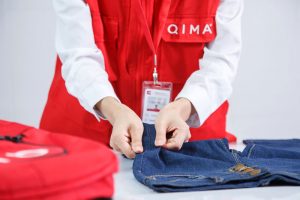 Ethical and compliant work environments are key to the textile and apparel industries.
Ethical and compliant work environments are key to the textile and apparel industries.
By Pierre-Nicolas Disser
Within the textile and apparel industries, where fabrics imports and exports cross all borders to meet ever-changing industry trends and consumer needs, ensuring the safety and quality of these materials has never been more important.
Whether you’re a manufacturer, global brand, sourcing and procurement professional or quality control company woven into the fabric of this industry, developing a reliable line of product that is compliant with safety and performance standards is vital to not only your business, but the sustainability of our industry; it safeguards consumers while nurturing brand growth and builds a culture of responsibility for the textile manufacturing landscape.
Regulatory bodies, including the Consumer Product Safety Commission (CPSC), Food and Drug Administration (FDA) and Customs and Border Protection (CBP) play pivotal roles in upholding standards for imported consumer goods.
For textile and apparel importers, compliance with these standards is not just a legal obligation but a moral imperative — a commitment to the safety and satisfaction of end-users.
 However, by prioritizing the safety and well-being of workers first, importers contribute to the creation of ethical supply chains where dignity and fairness are upheld. The steps taken by compliant factories to exceed those regulations support safe working environments and workforces that take pride in their craft.
However, by prioritizing the safety and well-being of workers first, importers contribute to the creation of ethical supply chains where dignity and fairness are upheld. The steps taken by compliant factories to exceed those regulations support safe working environments and workforces that take pride in their craft.
A study from the University of Southern California* reinforces the profound links between compliance, worker satisfaction, and product quality. When supply chain employees feel valued and protected, they invest themselves wholeheartedly in their work. Longevity within a company fosters experience and expertise, enhancing the overall quality of products and bolstering the reputation of the brand.
Utilizing these same concepts, auditors can also be contracted to review employee safety and labor on-site. This proactive approach helps minimize costly ethical and labor issues, further protecting both brand reputation and the health and safety of workers and maintaining industry integrity throughout the textiles supply chain.
Testing and inspections play a vital role by ensuring product quality, compliance with regulations and adherence to specific brand guidelines. Third-party testing, inspection and certification (TIC) agencies provide an even more important unbiased assessment, reducing the risk of shipping substandard goods and ensuring worker conditions are safe and ethical, fostering trust between buyers and suppliers. Through meticulous testing, inspections and audits, we can detect defects, verify product authenticity, and ensure safety standards are met.
Consider, for instance, the scenario of a textile factory where workers are treated with respect and provided with safe working conditions. In such an environment, employees are more likely to feel a sense of ownership and pride in their work. This sentiment translates into meticulous attention to detail and a commitment to excellence. Consequently, the products exported from such factories exude quality and reliability, earning the trust and loyalty of consumers. Conversely, in environments where worker safety and well-being are compromised, the repercussions are far-reaching. A disgruntled, insecure or simply unsafe workforce is less likely to deliver products of superior quality. Concerns about health and safety detract from productivity and morale, casting a shadow over the entire manufacturing process. Ultimately, neglecting compliance not only jeopardizes the safety of employees and its consumers, but also undermines the reputation and longevity of a brand.
 A quick review of QIMA data from earlier in the year** shows that ethical audits in South Asia, found a consistently high incidence of compliance violations related to working hours and wages, suggesting factories may be relying on unpaid or forced overtime to cope with the surge in order volumes. These trends are especially concerning, combined with the fact that supply chain visibility remains low across the board: The same survey found that only 16 percent of businesses globally were able to name all the suppliers involved in the making of their products.
A quick review of QIMA data from earlier in the year** shows that ethical audits in South Asia, found a consistently high incidence of compliance violations related to working hours and wages, suggesting factories may be relying on unpaid or forced overtime to cope with the surge in order volumes. These trends are especially concerning, combined with the fact that supply chain visibility remains low across the board: The same survey found that only 16 percent of businesses globally were able to name all the suppliers involved in the making of their products.
Reputation is everything. A brand synonymous with safety, quality and ethical practices commands loyalty and trust in the marketplace. By championing transparency and ethical practices, reinforced by a thorough, credible third-party inspection team, textile brands of all sizes can inspire confidence among consumers and stakeholders, positioning themselves as leaders in responsible sourcing.
* https://appliedpsychologydegree.usc.edu/blog/the-importance-of-job-satisfaction-in-todays-workforce
** https://www.qima.com/newsroom/news/news-q2-2024-barometer
Editor’s Note: Pierre-Nicolas Disser is CEO, Consumer Products, QIMA
August 15, 2024




